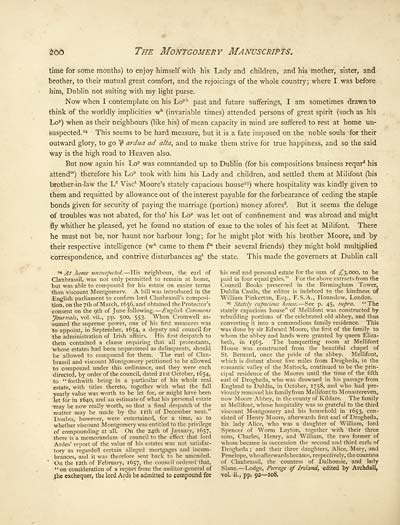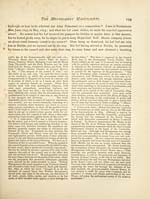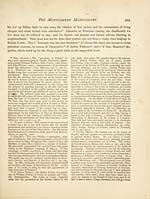Montgomery manuscripts
(214) Page 200
Download files
Complete book:
Individual page:
Thumbnail gallery: Grid view | List view

200
The Montgomery Manuscripts.
time for some months) to enjoy himself with his Lady and children, and his mother, sister, and
brother, to their mutual great comfort, and the rejoicings of the whole country; where I was before
him, Dublin not suiting with my light purse.
Now when I contemplate on his Lo p ' 3 past and future sufferings, I am sometimes drawn to
think of the worldly implicities w h (invariable times) attended persons of great spirit (such as his
Lo p ) when as their neighbours (like his) of mean capacity in mind are suffered to rest at home un-
suspected. 24 This seems to be hard measure, but it is a fate imposed on the noble souls for their
outward glory, to go ^ ardua ad alta, and to make them strive for true happiness, and so the said
way is the high road to Heaven also.
But now again his Lo p was commanded up to Dublin (for his compositions business requr d his
attend") therefore his Lo p took with him his Lady and children, and settled them at Milifont (his
brother-in-law the L d Vise' Moore's stately capacious house 25 ) where hospitality was kindly given to
them and requitted by allowance out of the interest payable for the forbearance of ceding the staple
bonds given for security of paying the marriage (portion) money afores d . But it seems the deluge
of troubles was not abated, for tho' his Lo p was let out of confinement and was abroad and might
fly whither he pleased, yet he found no station of ease to the soles of his feet at Milifont. There
he must not be, nor haunt nor harbour long; for he might plot with his brother Moore, and by
their respective intelligence (w h came to them f™ their several friends) they might hold multiplied
correspondence, and contrive disturbances ag' the state. This made the governers at Dublin call
"* At home unsuspected. — His neighbour, the earl of
Clanbrassil, was not only permitted to remain at home,
but was able to compound for his estate on easier terms
than viscount Montgomery. A bill was introduced in the
English parliament to confirm lord Clanbrassil's composi-
tion, on the 7th of March, 1656, and obtained the Protector's
consent on the 9th of June following. — English Commons
Journals, vol. vii., pp. 500, 553. "When Cromwell as-
sumed the supreme power, one of his first measures was
to appoint, in September, 1654, a deputy and council for
the administration of Irish affairs. His first despatch to
them contained a clause requiring that all protestants,
whose estates had been sequestered as delinquents, should
be allowed to compound for them. The earl of Clan-
brassil and viscount Montgomery petitioned to be allowed
to compound under this ordinance, and they were each
directed, by order of the council, dated 21st October, 1654,
to " forthwith bring in a particular of his whole real
estate, with titles thereto, together with what the full
yearly value was worth to be let for, or might have been
let for in 1 640, and an estimate of what his personal estate
may be now really worth, so that a final despatch of the
matter may be made by the nth of December next."
Doubts, however, were entertained, for a time, as to
whether viscount Montgomery was entitled to the privilege
of compounding at all. On the 24th of January, 1657,
there is a memorandum of council to the effect that lord
Ardes' report of the value of his estates was not satisfac-
tory as regarded certain alleged mortgages and incum-
brances, and it was therefore sent back to be amended.
On the 12th of February, 1657, the council ordered that,
' ' on consideration of a report from the auditor-general of
the exchequer, the lord Ards be admitted to compound for
his real and personal estate for the sum of ^3,000, to be
paid in four equal gales. " For the above extracts from the
Council Books preserved in the Birmingham Tower,
Dublin Castle, the editor is indebted to the kindness of
William Pinkerton, Esq., F.S.A., Hounslow, London.
=s Stately capacious house. — See p. 45, supra. "The
stately capacious house" of Mellifont was constructed by
rebuilding portions of the celebrated old abbey, and thus
converting it into a commodious family residence. This
was done by sir Edward Moore, the first of the family to
whom the abbey and lands were granted by queen Eliza-
beth, in 1565. The banquetting room at Mellifont
House was constructed from the beautiful chapel of
St. Bernard, once the pride of the abbey. Mellifont,
which is distant about five miles from Drogheda, in the
romantic valley of the Mattock, continued to be the prin-
cipal residence of the Moores until the time of the fifth
earl of Drogheda, who was drowned in his passage from
England to Dublin, in October, 1758, and who had pre-
viously removed his family from Mellifont to Monastereven,
now Moore Abbey, in the county of Kildare. The family
at Mellifont, whose hospitality was so grateful to the third
viscount Montgomery and his household in 1653, con-
sisted of Henry Moore, afterwards first earl of Drogheda,
his lady Alice, who was a daughter of William, lord
Spencer of Worm Layton, together with their three
sons, Charles, Henry, and William, the two former of
whom became in succession the second and third earls of
Drogheda ; and their three daughters, Alice, Mary, and
Penelope, whoafterwardsbecame, respectively, thecountess
of Clanbrassil, the countess of Dalhousie, and lady
Slane. — Lodge, Peerage of Ireland, edited by Archdall,
vol. ii., pp. $2 — 108.
The Montgomery Manuscripts.
time for some months) to enjoy himself with his Lady and children, and his mother, sister, and
brother, to their mutual great comfort, and the rejoicings of the whole country; where I was before
him, Dublin not suiting with my light purse.
Now when I contemplate on his Lo p ' 3 past and future sufferings, I am sometimes drawn to
think of the worldly implicities w h (invariable times) attended persons of great spirit (such as his
Lo p ) when as their neighbours (like his) of mean capacity in mind are suffered to rest at home un-
suspected. 24 This seems to be hard measure, but it is a fate imposed on the noble souls for their
outward glory, to go ^ ardua ad alta, and to make them strive for true happiness, and so the said
way is the high road to Heaven also.
But now again his Lo p was commanded up to Dublin (for his compositions business requr d his
attend") therefore his Lo p took with him his Lady and children, and settled them at Milifont (his
brother-in-law the L d Vise' Moore's stately capacious house 25 ) where hospitality was kindly given to
them and requitted by allowance out of the interest payable for the forbearance of ceding the staple
bonds given for security of paying the marriage (portion) money afores d . But it seems the deluge
of troubles was not abated, for tho' his Lo p was let out of confinement and was abroad and might
fly whither he pleased, yet he found no station of ease to the soles of his feet at Milifont. There
he must not be, nor haunt nor harbour long; for he might plot with his brother Moore, and by
their respective intelligence (w h came to them f™ their several friends) they might hold multiplied
correspondence, and contrive disturbances ag' the state. This made the governers at Dublin call
"* At home unsuspected. — His neighbour, the earl of
Clanbrassil, was not only permitted to remain at home,
but was able to compound for his estate on easier terms
than viscount Montgomery. A bill was introduced in the
English parliament to confirm lord Clanbrassil's composi-
tion, on the 7th of March, 1656, and obtained the Protector's
consent on the 9th of June following. — English Commons
Journals, vol. vii., pp. 500, 553. "When Cromwell as-
sumed the supreme power, one of his first measures was
to appoint, in September, 1654, a deputy and council for
the administration of Irish affairs. His first despatch to
them contained a clause requiring that all protestants,
whose estates had been sequestered as delinquents, should
be allowed to compound for them. The earl of Clan-
brassil and viscount Montgomery petitioned to be allowed
to compound under this ordinance, and they were each
directed, by order of the council, dated 21st October, 1654,
to " forthwith bring in a particular of his whole real
estate, with titles thereto, together with what the full
yearly value was worth to be let for, or might have been
let for in 1 640, and an estimate of what his personal estate
may be now really worth, so that a final despatch of the
matter may be made by the nth of December next."
Doubts, however, were entertained, for a time, as to
whether viscount Montgomery was entitled to the privilege
of compounding at all. On the 24th of January, 1657,
there is a memorandum of council to the effect that lord
Ardes' report of the value of his estates was not satisfac-
tory as regarded certain alleged mortgages and incum-
brances, and it was therefore sent back to be amended.
On the 12th of February, 1657, the council ordered that,
' ' on consideration of a report from the auditor-general of
the exchequer, the lord Ards be admitted to compound for
his real and personal estate for the sum of ^3,000, to be
paid in four equal gales. " For the above extracts from the
Council Books preserved in the Birmingham Tower,
Dublin Castle, the editor is indebted to the kindness of
William Pinkerton, Esq., F.S.A., Hounslow, London.
=s Stately capacious house. — See p. 45, supra. "The
stately capacious house" of Mellifont was constructed by
rebuilding portions of the celebrated old abbey, and thus
converting it into a commodious family residence. This
was done by sir Edward Moore, the first of the family to
whom the abbey and lands were granted by queen Eliza-
beth, in 1565. The banquetting room at Mellifont
House was constructed from the beautiful chapel of
St. Bernard, once the pride of the abbey. Mellifont,
which is distant about five miles from Drogheda, in the
romantic valley of the Mattock, continued to be the prin-
cipal residence of the Moores until the time of the fifth
earl of Drogheda, who was drowned in his passage from
England to Dublin, in October, 1758, and who had pre-
viously removed his family from Mellifont to Monastereven,
now Moore Abbey, in the county of Kildare. The family
at Mellifont, whose hospitality was so grateful to the third
viscount Montgomery and his household in 1653, con-
sisted of Henry Moore, afterwards first earl of Drogheda,
his lady Alice, who was a daughter of William, lord
Spencer of Worm Layton, together with their three
sons, Charles, Henry, and William, the two former of
whom became in succession the second and third earls of
Drogheda ; and their three daughters, Alice, Mary, and
Penelope, whoafterwardsbecame, respectively, thecountess
of Clanbrassil, the countess of Dalhousie, and lady
Slane. — Lodge, Peerage of Ireland, edited by Archdall,
vol. ii., pp. $2 — 108.
Set display mode to:
![]() Universal Viewer |
Universal Viewer | ![]() Mirador |
Large image | Transcription
Mirador |
Large image | Transcription
Images and transcriptions on this page, including medium image downloads, may be used under the Creative Commons Attribution 4.0 International Licence unless otherwise stated. ![]()
| Histories of Scottish families > Montgomery manuscripts > (214) Page 200 |
|---|
| Permanent URL | https://digital.nls.uk/95235495 |
|---|
| Description | A selection of almost 400 printed items relating to the history of Scottish families, mostly dating from the 19th and early 20th centuries. Includes memoirs, genealogies and clan histories, with a few produced by emigrant families. The earliest family history goes back to AD 916. |
|---|

